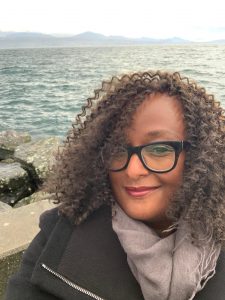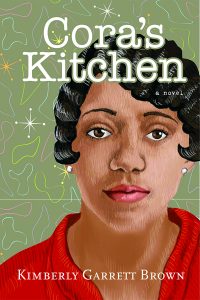The Guest Post: The Journaling and Yoga connection
 I have always been drawn to yoga as an antidote to my busy life. When the flurry of activities surrounding the release of my debut novel, Cora’s Kitchen, began, I thought a regular practice would help me work all the preparations for the book launch. I signed up to be certified as a yoga instructor. I figured if I knew how to teach yoga, I would be able to internalize the relaxing music, plants, soft colors, and candles I found in my favorite yoga studio. Also, if I’m honest, I hoped it would give me a legitimate reason to wear yoga pants all the time. But yoga is so much more than feeling zen and moving through poses. Yoga is the union of mind, body, and spirit in order to understand yourself and the world around you. In many ways, it’s like the writing practice of journaling.
I have always been drawn to yoga as an antidote to my busy life. When the flurry of activities surrounding the release of my debut novel, Cora’s Kitchen, began, I thought a regular practice would help me work all the preparations for the book launch. I signed up to be certified as a yoga instructor. I figured if I knew how to teach yoga, I would be able to internalize the relaxing music, plants, soft colors, and candles I found in my favorite yoga studio. Also, if I’m honest, I hoped it would give me a legitimate reason to wear yoga pants all the time. But yoga is so much more than feeling zen and moving through poses. Yoga is the union of mind, body, and spirit in order to understand yourself and the world around you. In many ways, it’s like the writing practice of journaling.
Journaling played a significant role in Cora’s Kitchen, an epistolary novel set in 1928 during the Harlem Renaissance. Cora dreams of being a writer but doesn’t have the luxury of time to write though she keeps a journal. Ultimately, writing in her journal teaches her how to write and provides the raw material for her short stories.
As a practice, journaling is mostly about showing up to the page and letting your thoughts flow. In its purest state, you come face to face with your authentic selves, connecting the mind, body, and spirit in the act of discovery. And much like yoga, there are various ways to approach it. Morning pages and free writing are my favorite methods.
Morning pages, one of the three basic principles from The Artist Way by Julia Cameron, are done first thing in the morning. They are three continuous pages of longhand writing about anything and everything that comes to mind. The idea is to catch the first thoughts of the day before being bombarded with the outside world. I am always amazed at the insight and creativity that emerges when I do it as prescribed. Though to be honest, my tendency is to grab my phone before my journal first thing in the morning.
Free writing, on the other hand, isn’t tied to a specific time of day. It is continuous writing done for a set amount of time. You write quickly without rushing or worrying about spelling or grammar. And when you think of a particular word or run out of things to say, you simply write, I can’t think of what to say. What’s important is writing without stopping, so you are not tempted to censor yourself. Over the years my free writing time has grown from 15 minutes to 45 minutes. The first 20 minutes of writing is easy as I clear the clutter of my thinking, but after that my whole body becomes engaged from fatigue. It seems to trigger something inside of me that releases a deeper intuitive understanding about myself and the world around me. What’s discovered on those pages have often turned in to larger writing projects like personal essays, short stories or even novels.
With both morning pages and free writing, the page acts like a yoga mat in that the continuous movement of your hand or hands as you write unearths thoughts buried beneath the conscious mind. Regular practice has a way of awakening creativity, answering questions, and conveying fresh insights. The mat is the classroom in yoga. The page is the classroom in journaling.
While writing Cora’s Kitchen, I found myself stuck and unsure how to fix a particular problem brought to my attention by my writing group. Honestly, I was pretty annoyed with the group about their comments. I planned to use journaling to complain about their observations. I started writing about how much my writing group didn’t understand my work. I quickly realized that wasn’t leading me anywhere. One of the group members was working on a memoir, and reading her work made me think about my childhood. I started to ponder what themes I would focus on if I wrote a memoir. I wrote a few vague memories and hit on a disturbing one that brought me to tears. I continued to write through the tears unearthing powerful information. The time spent journaling became the catalyst to not only fixing the problem the group had shared with me but led me to the novel’s climax.
Both yoga and journaling have taught me to understand when to challenge myself and when to be content with where my work is in that moment. It also helped me be more compassionate and patient with myself. And at the end of the day, those are things we all need individually and collectively.
 About the Book
About the Book
Cora James, a 35-year-old Black librarian in Harlem, dreams of being a writer. Torn between her secret passion and the duties of a working wife and mother in 1928, Cora strikes up correspondence with renowned poet Langston Hughes, who encourages her to pursue her dream. Duty frustrates Cora again, this time when she’s called upon to fill in for her cousin Agnes while she recovers from a brutal beating by her husband Bud.
Working as a cook for a white woman, Cora discovers both time to write and an unlikely ally in Mrs. Eleanor Fitzgerald, who becomes friend, confidante, and patron, encouraging Cora to rise above what’s commonly thought of as “a woman’s lot.” Yet, through a series of startling developments in her dealings with the white family, Cora’s journey to becoming a writer takes her to the brink of losing everything, including her life.
In the Fitzgerald home, Cora discovers she has time to write and brings her notebook to work. When she comforts Mrs. Fitzgerald after an argument with Mr. Fitzgerald, a friendship forms. Mrs. Fitzgerald insists Cora call her Eleanor and gives her The Awakening by Kate Chopin to read. Cora is inspired by the conversation to write a story and sends it to Langston. Eventually she begins to question her life and marriage and starts to write another story about a woman’s sense of self. Through a series of letters, and startling developments in her dealings with the white family, Cora’s journey to becoming a writer takes her to the brink of losing everything, including her life.
About the Author
KIMBERLY GARRETT BROWN is Publisher and Executive Editor of Minerva Rising Press. Her work has appeared in Black Lives Have Always Mattered: A Collection of Essays, Poems and Personal Narratives, The Feminine Collective, Compass Literary Magazine, Today’s Chicago Woman, Chicago Tribune, The Rumpus, and elsewhere. Her first novel, Cora’s Kitchen, comes out from Inanna Publications in September 2022. It was a finalist in the 2018 William Faulkner – William Wisdom Creative Writing Competition and the 2016 Louise Meriwether First Book Prize. She earned her MFA at Goddard College. She currently lives in Boca Raton, Florida.
Find Kimberly online at:
- Website: https://kimberlygarrettbrown.com
- twitter: https://twitter.com/kimgarrettbrown
- Facebook: https://www.facebook.com/kimgarrettbrown


 Jill-Elizabeth LinkedIn
Jill-Elizabeth LinkedIn



Leave a Reply